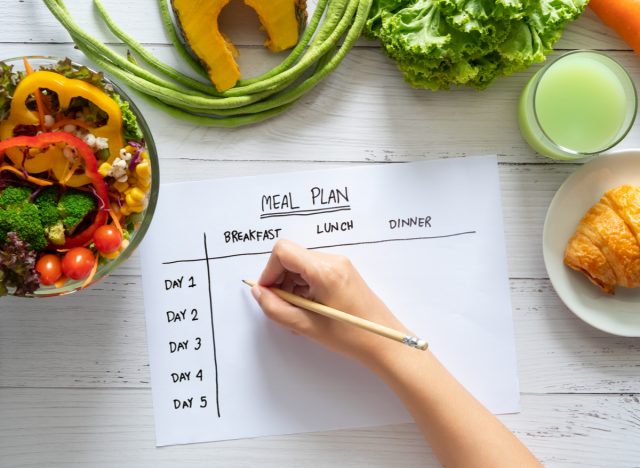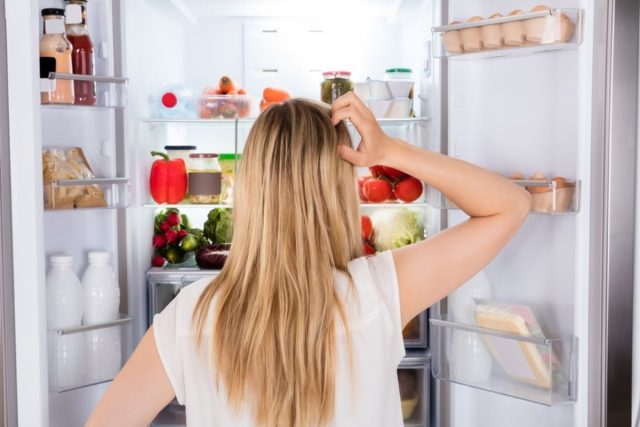6 Tips To Manage Emotional Eating, Say Dietitians

It's safe to say that most of us know what it feels like to finish a whole carton of ice cream when we are sad, or to munch on an entire bag of chips when we are feeling bored and restless. While there is no shame in moments like this because it's extremely common, emotional eating on a regular basis may not be the best for our health.
Cleveland Clinic defines emotional eating as using food to escape or numb our feelings during times of discomfort. For those who feel they turn to food every time they feel an uncomfortable emotion, it may become frustrating and feel quite discouraging to try and find different ways of coping.
To learn more, we chatted with a couple of expert dietitians about helpful strategies for managing a habit of emotional eating. Read on, and for more tips check out 5 Worst Eating Habits for Sugar Cravings, Says Dietitian.
Reassess your current meal plan.

Many people who turn to food for comfort may not think that they need to be eating more, but Rachel Fine, RDN a registered dietitian and founder of To The Pointe Nutrition, shares that eating more nutrient-dense foods throughout the day may help you manage your emotional eating.
"If you consistently eat to a point of physical discomfort, then consider the possibility that your baseline food intake is too low," says Fine. "Under-eating is extremely common these days, and it often results from both busy schedules and incorrect food beliefs sprung from diet culture. Not eating enough can exacerbate experiences of emotional eating later on in the day as your body attempts to make up for a previous energy deficit."
Seek credible support.

You may be emotional eating due to the environment around you, and learning how to cope with the subsequent feelings can help. "The shame and guilt that is often associated with emotional eating is a learned reaction from diet culture," says Fine. "Unlearning these food beliefs is an incredibly important step for wanting to feel empowered at mealtimes."
One way that Fine suggests working through this unlearning is with the guidance of a professional. "A licensed dietitian and mental health therapist can provide the support needed to help with instances of emotional eating."
Have a list of go-to coping tools.

There's no shame in turning to food for comfort in times of emotional stress because every single person has ways that they cope in these moments.
"Emotional eating is often given a bad rap in our culture, but turning to food during times of heightened emotional triggers like anxiety, stress, overwhelm, and worry, is arguably not the worst thing you can be doing," says Fine. "However, using food to cope will only offer a temporary distraction and therefore, additional coping tools are strongly encouraged."
If you're someone who feels like they may be an emotional eater, it can be helpful to start asking yourself about other coping strategies you can turn to in times of stress.
"I always have my clients develop a menu of coping mechanisms, whether it's for when they feel stressed, bored, or sad," says Sarah Anzlovar, MS, RDN, LDN, a registered dietitian nutritionist and owner of Sarah Gold Nutrition. "They put it in an easily accessible place like on the notes app on their phone or on a sticky note on their desk, so when emotions strike and they want to reach for food, they can easily choose another option."
If you need some help thinking of different coping strategies, Anzlovar suggests a quick walk around the block, some deep breathing exercises, or calling a friend. Fine adds that listening to your favorite music or reading a book "can be helpful for navigating those times of discomfort."
Pause and check in.

When you find yourself reaching for comfort food, Anzlovar suggests "pausing to ask yourself, 'what do I really need right now,' which can help you learn to process challenging emotions and figure out what is really going to help you feel better."
It might take some practice and it may feel strange at first, but Anzlovar says this practice is absolutely worth it.
"While food may temporarily make you feel better, it's often fleeting and then you're left feeling badly about what you ate and still feeling stressed, sad, bored, or frustrated," says Anzlovar. "For example, maybe you actually need connection, and calling a friend or setting up a date night with your partner will be helpful. Or if you're overwhelmed at work, maybe what you actually need is help prioritizing."
Make sure you're eating well-balanced meals and snacks.

One way to help you manage emotional eating is to make sure you're giving your body plenty of the nutrients it needs throughout the day.
"When we give our body and brain enough energy and keep our blood sugar stable by balancing protein, fiber-rich carbs, and fats, we are better equipped to handle challenging emotions," says Anzlovar. "When you're under-eating, whether that's not enough calories or not enough of a specific macronutrient like carbs, your brain doesn't have the ability to process emotions well."
Be mindful that you may just be hungry!

Another thing that Anzlovar points out is that it may not always be emotional eating. "If you're overly hungry, it may feel like you're eating because you're stressed or sad, but it may just be your body asking for energy." This is another reason to make sure you're eating enough and being kind to your body by giving it plenty of nutritious food.









